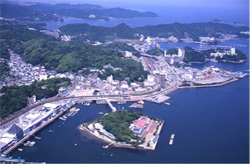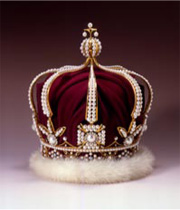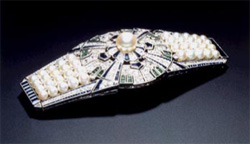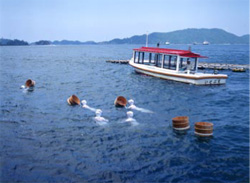Home > Highlighting JAPAN > Highlighting Japan DECEMBER 2011 > Mikimoto Pearl Museum
Highlighting JAPAN
THE NATION'S MUSEUMS
Mikimoto Pearl Museum
Julian Ryall visits Mikimoto Pearl Island in Toba, Mie Prefecture, where more than a century ago Kokichi Mikimoto became the first man in the world to culture the coveted pearl oyster.

Aerial view of Mikimoto Pearl Island in Mie Prefecture
Credit: © MIKIMOTO PEARL ISLAND
"Pearls are the only gem that is already perfect when we see them for the first time," says Matsuzuki, the director and curator of the Pearl Museum, on Mikimoto Pearl Island in Mie Prefecture. "With diamonds, rubies or sapphires, they need to be cut and polished to get the most out of them. But a pearl is beautiful from the first moment that you see it."
Matsuzuki oversees the large museum that is dedicated to the pearl on the small island that lies about 70 yards off the town of Toba where the "Pearl King" Kokichi Mikimoto succeeded in culturing the very first pearl oyster in 1893.
In the late 1920s, the island was opened only for a limited number of guests. That changed in 1951 and the 48 million visitors since have included queens, princes, heads of state and captains of industry, all attracted by these beautiful translucent spheres.

This Pearl Crown was made in 1978 to commemorate the 85th anniversary of the birth of cultured pearls. The Crown is made of 18 carat gold studded with 872 lustrous Mikimoto cultured pearls.
Credit: © MIKIMOTO PEARL ISLAND
To create a pearl, a wedge is inserted into the mouth of the shell and a mantle of clear membrane placed alongside the round nuclei, made of polished mussel shell, that will eventually be coated in mother-of-pearl.

On display at the Mikimoto Pearl Museum, this "yaguruma" (wheel of arrows) sash clip was first exhibited at the World Exposition in Paris in 1937. The clip is set with twenty pearls of 3.5 mm–4 mm and one pearl of 8.75 mm in the center, along with diamonds, sapphires and emeralds.
Credit: © MIKIMOTO PEARL ISLAND
The museum also shows how the pearls are selected to be strung onto lengths of silk thread, with the stringers required to have a good eye to match pearls of similar luster, color and size. The downstairs area also has an extensive collection of photos related to the pearl industry from around the world, including images of the famous women ama divers of Mie Prefecture.
On the upper level of the museum, visitors can admire the works of art that pearls can become. Matsuzuki and his colleagues began gathering examples of fine jewelry that make use of pearls in 1985 and have built up a collection of around 250 items.

Visitors to Mikimoto Pearl Island can watch the ama pearl divers at work from close quarters.
Credit: © MIKIMOTO PEARL ISLAND
The artisans of Mikimoto have also created a number of breathtaking larger works of art, including a scale replica of an ancient temple in Nara that has 12,760 pearls, a crown based on a Byzantine crown from the Middle Ages that took fourteen months to make and has 796 top-quality pearls and 17 diamonds, and a replica of the Liberty Bell that was displayed in New York and uses 12,250 pearls and 366 diamonds.
Elsewhere on the island is the Kokichi Memorial Hall, which tells visitors of the life and times of Mikimoto, who died in 1954 at the age of ninety-six. There is also a large statue to the founder of the company, a shop with an extensive selection of pearl products and a place where visitors can watch a demonstration by the ama women divers, dressed in the traditional white robes of the profession.
| Access and Admission | |
| Address: | Mikimoto Pearl Island, 1-7-1 Toba City, Mie Prefecture, Japan |
| Tel/Fax: | +81 (0)599-25-2028/+81 (0)599-25-2655 |
| Website: | www.mikimoto-pearl-museum.co.jp/en/index.html |
| Opening Hours: | January to March and month of November, 8:30 a.m. to 5 p.m. April to October, 8:30 a.m. to 5:30 p.m. December, 9 a.m. to 4:30 p.m. |
| Tickets: | Adults (16+), ¥1,500; children (7–15), ¥750 |
© 2009 Cabinet Office, Government of Japan






